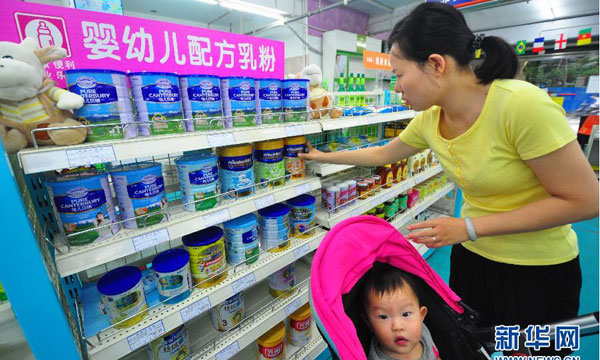

 |
| File photo |
BEIJING, April 20 -- Tougher regulations on infant milk formula will be introduced to restore public confidence in the domestic dairy industry.
Producers will be required to register powdered baby milk formula with the food and drug regulatory agency, according to a draft revision to the Food Safety Law, submitted to the bi-monthly legislative session of the National People's Congress (NPC) Standing Committee for its third reading on Monday.
The policy change is more strict than an earlier draft submitted in December, which stipulated that firms only needed to ensure their powdered baby milk formulas were on record.
There are more than 1,900 varieties of baby formula available in China and each company has around 20 varieties each. In other countries, firms produce and sell two or three, according to the Food and Drug Administration.
"Some producers [are creating] new formulas purely for the sake of marketing," said the lawmakers. "This review of infant formula legislation aims to ensure infant food safety."
In 2008, infant formula produced by the Sanlu Group, a leading dairy firm in north China, was found to contain melamine. Six babies died and thousands fell ill.
As a result, the first Food Safety Law was enacted in 2009 but public confidence in domestic baby formula has not recovered.
Instead, consumers have demanded baby formula from countries like Australia, New Zealand and Germany, which have limited export quotas on milk powder destined for China.
Another notable change in Monday's draft proposal is the deletion of the ban on infant formula production by original equipment manufacturers (OEM).
The earlier revision submitted for the second reading prohibited all baby formula produced by OEMs, including imported dairy products.
Lawmakers argued OEM is an international practice and the complete prohibition by law does not conform to the rule of market economy.
Legislators are also considering adding new provisions to the Food Safety Law on special foods dedicated to medical use, which are currently unregulated.
Formula foods consumed by patients with certain diseases have long been regarded as drugs until China's health authorities unveiled a national standard for such products in 2013, shifting them to the category of food.
According to the proposal, producers of such formula foods are required to register with the country's food and drug regulatory agencies.
At Monday's reading, Lawmakers also voiced their concerns about provisions on the use of toxic pesticides in the amendment.
According to a new article, the country will encourage and support the use of effective pesticides with low toxicity and residues, speed up a full ban on highly toxic pesticides and promote the research and application of substitutes.
Despite the failure to propose a complete prohibition of highly toxic pesticides, the draft added a special provision to forbid the use of highly toxic pesticides in the planting of vegetables, fruit, tea and medicinal herbs.
China still stocks certain highly toxic pesticides for emergency use. The Ministry of Agriculture said a full ban is not realistic due to the threat of food security.
Zhang Dejiang, chairman of the NPC Standing Committee, presided over the opening meeting of the session, which runs from Monday through Friday.
 J-11 fighters in air exercise
J-11 fighters in air exercise Beauties dancing on the rings
Beauties dancing on the rings Attendants-to-be join Mr. & Miss Campus Contest
Attendants-to-be join Mr. & Miss Campus Contest Beijing's toughest anti-smoking law takes effect
Beijing's toughest anti-smoking law takes effect Family lives in cave for about 50 years in SW China
Family lives in cave for about 50 years in SW China PLA soldiers operating vehicle-mounted guns in drill
PLA soldiers operating vehicle-mounted guns in drill Blind carpenter in E China's Jiangxi
Blind carpenter in E China's Jiangxi China hosts overseas disaster relief exercise for the first time
China hosts overseas disaster relief exercise for the first time 20 pairs of twins who will become flight attendants in Sichuan
20 pairs of twins who will become flight attendants in Sichuan Obama is sowing discontent in S.China Sea
Obama is sowing discontent in S.China Sea Rescuers work through night to reach cruise ship survivors
Rescuers work through night to reach cruise ship survivors Driving through limbo
Driving through limbo Facing down MERS
Facing down MERSDay|Week